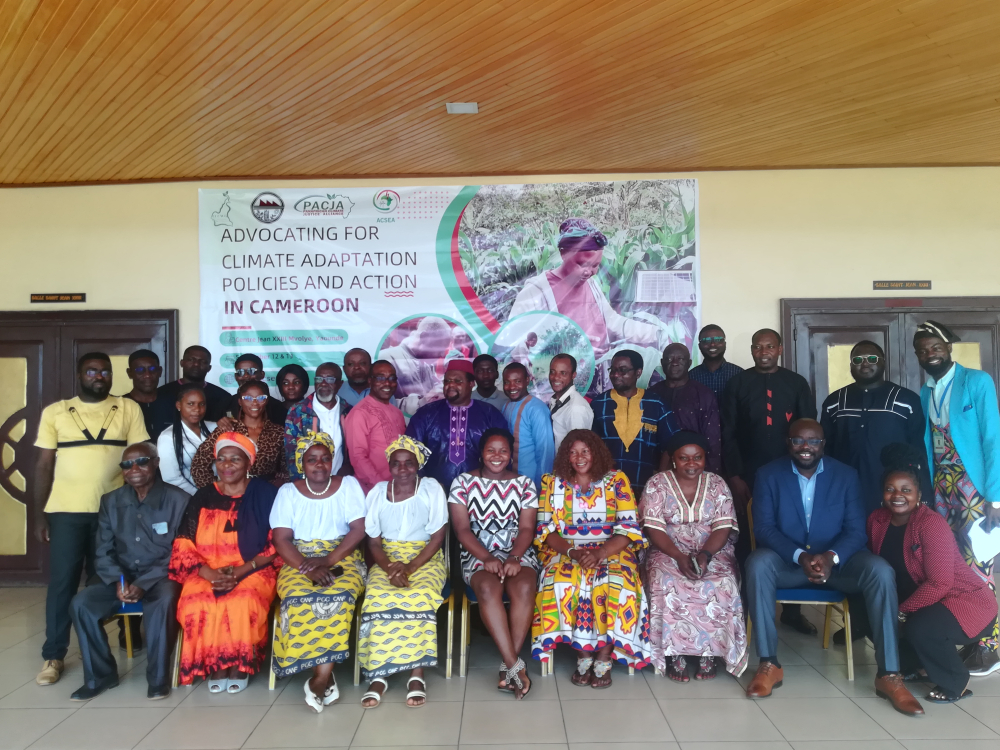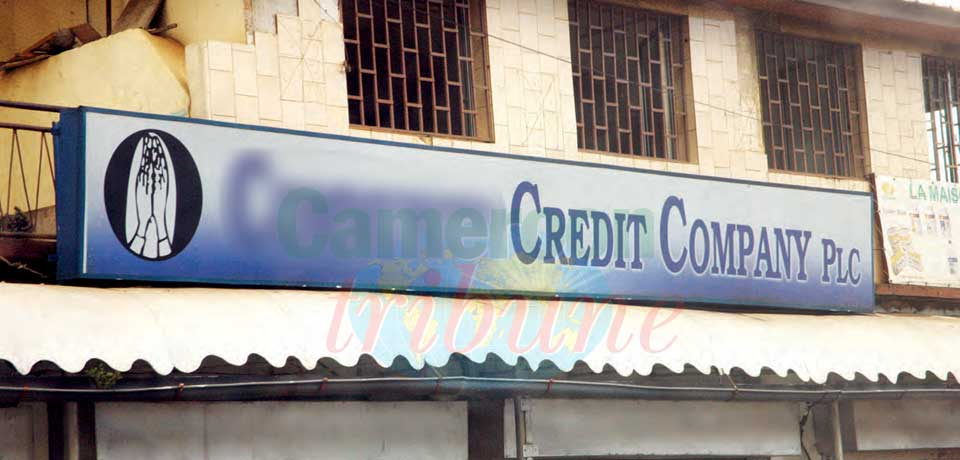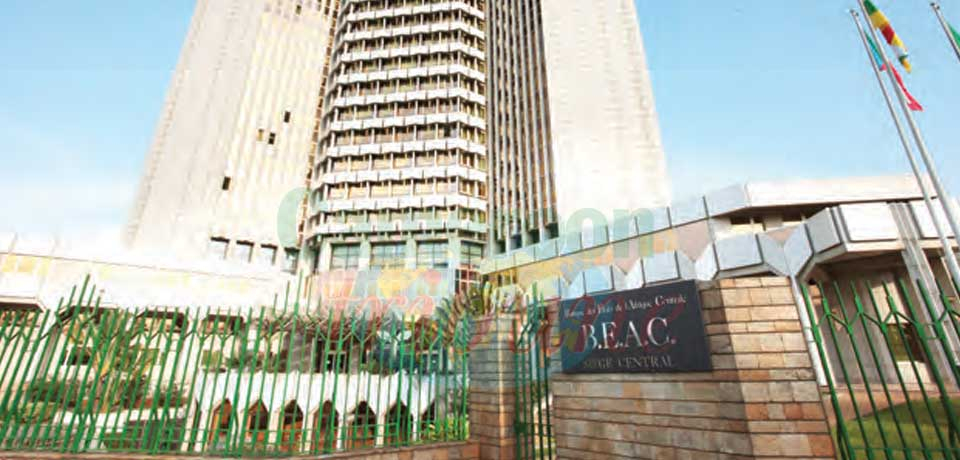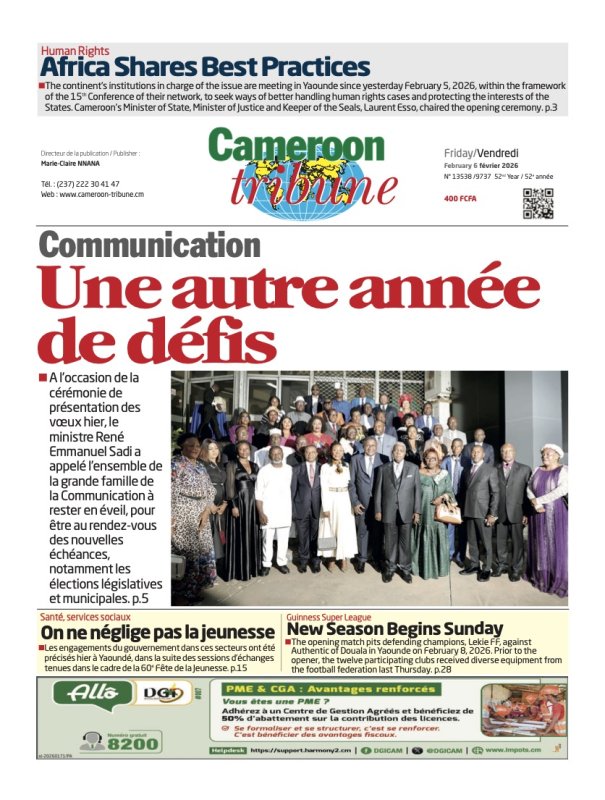Climate Crisis: It’s Time To Change Habits To Stay Alive!
- Par Kimeng Hilton
- 12 Sep 2023 17:09
- 0 Likes

A two-day workshop opened in Yaounde on September 12, 2023 on strengthening the capacity of faith-based organizations, farmers, youth and women groups to advocate for climate adaptation policies and actions in Cameroon.
“The participants for the workshop are key people – on purpose. Faith-based people, agricultural people, youth and women, are all represented in the training… Adapting to climate change effects is important because women and youth suffer the most from the climate crisis,” said Dr Augustine Njamnshi, the Executive Director of the African Coalition for Sustainable Energy and Access, ACSEA.
Empowering Women, Youth
He spoke in Yaounde on Tuesday, September 12, 2023 on the first day of a two-day workshop on “Capacity-Strengthening Workshop for Faith-Based Organizations, Small-Scale Farmers, Youth, And Women Groups in Advocating for Climate Adaptation Policies and Actions in Cameroon.” The training is organized by the African Coalition for Sustainable Energy and Access, ACSEA.
Learning From Each Other
Dr Njamnshi recalled that youth fetch firewood, while women do farming. “Pastors, Moslems, traditional religious leaders are part of the workshop. Participants are expected to do something upon returning home from the workshop… Participants will propose recommendations, committing to do something to adapt to climate change. We did not invite you to teach you, but to learn from you. We need to learn from ourselves,” Dr Njamnshi pointed out.
Irregular Rains, Droughts
“Irregular rains are evidence of climate change, obliging people to shift from the normal way of life because of the unpredictability of rains,” said Eugene Nforngwa, the Lead Expert on Just Transition and Energy Access with the Pan-African Climate Justice Alliance, PACJA. According to Nforngwa, the impacts of the climate crisis are numerous: “Water scarcity affects livestock, farming and households as they do not have enough to consume. Droughts cause failed harvests, resulting in malnutrition, herder-farmer conflicts,” Nforngwa noted.
Kribi’s Altered Ecosystems
A workshop participant from Kribi in Ocean Division of South Region said local ecosystems have changed as a result of several activities going on in the division. Like the Campo Ma’an National Park, the Kribi Marine Park, logging, industries. “To adapt means to cope, to find new ways of doing things, how to live with a situation… To adapt also means to adjust, to stay alive, change behavior…. To adapt to drought, you water or irrigate your crops; change seeds or crop variety for crops that are resilient in dry conditions; migrate to wetter places. Or change planting seasons and behaviour/habit by waiting to see if rains will be heavy before going ahead with planting,” Eugene Nforngwa counseled.
Changing Behaviour To Adapt
According to him, it is possible to adapt to future changes. “To adapt, you have to change behaviour. Adaptation to climate change by government and Non-governmental Organizations is not sustainable,” Nforngwa warned. “But community-led adaptation initiatives are more sustainable,” he noted.
The Place Of Local Communities
“Communities must be at the centre of decision-making at the lowest level as much as possible in promoting adaptation. To promote adaptation, you first address structural inequalities that hinder women from participating like funding for adaptation, investing in local institutions and capabilities,” Nforngwa underscored. He explained that resort to local adaptation initiatives is necessary because local communities understand their situation better. And less resources are required to achieve optimal results.
Miracle Bio Fertilizer!
Mbong Kimbi did a presentation on the project: “Bio Fertilizer: The Need of the Hour in Agriculture in the Face of Climate Change Crises. Building Resilience and Adaptive Capacities of Framers in Donga-Mantung Division, North West Region of Cameroon Using Bio Fertilizer” undertaken ACSEA. She said the project has tremendously increased the quality and quantity of crop yields in Donga-Mantung Division.
Spectacular Yields, Productivity
“Every beneficiary family is rejoicing at the spectacular yields. The difference is in the quality and quantity of crop harvests,” Mbong emphasized. “The project, which planned to train 100 farmers in two subdivisions of Donga-Mantung Division ended up assisting 363 farmers (women and youth) because of the great interest generated by the huge success of the project. Because of this, the bio fertilizer project will be expanded to other regions of Cameroon,” Dr Augustine Njamnshi announced.
Most Pressing Global Issue
According to the organizers of the workshop, climate change is one of the most pressing global challenges of our time. Its impact has been felt in various sectors, including agriculture, water resources, health, and ecology. Vulnerable communities, such as small-scale farmers, women, and youth are more affected by these changes due to limited resources and their social vulnerability. Vulnerable communities have moral authority, social networks (like faith-based organizations), and basic organizational skills to raise awareness of the problem and pressure decision-makers to take concrete action.
Recurrent Cameroon Floods
In Cameroon, over 120, 000 people are affected by floods yearly, and most of these people are concentrated in the coastal plains and Adamawa region. Prolonged dry seasons in the western highlands limit the water availability for crop and livestock production. Receding water levels in the Lake Chad Basin and irregular rainfall patterns are a threat to food security. This water shortage has fueled conflicts between farmers and herders over water resources. Prompt climate adaptation actions are needed to reduce the risks and vulnerabilities of the impacts, and to assist communities in becoming more resilient to climate change.
Influential Faith-based People
Faith-based organizations, small-scale farmers, youth and women groups often have a strong moral imperative to act on climate change, but they may lack the knowledge and skills to effectively advocate for climate adaptation policies and actions. Small-scale farmers are often on the front lines of climate change but are limited by resources and tools to advocate for their own interests.
Urgency Of The Issue
While many young people are unaware of the urgency of climate actions or how to effectively advocate for change, women are disproportionately affected by climate change but are more often excluded from decision-making processes. This training will help bridge these capacity gaps by providing participants with the knowledge, skills, and resources needed to effectively advocate for climate adaptation policies and actions.
Workshop Objectives
The main objective of the workshop is to strengthen the skills of faith-based organizations, women and youth groups, and farmers' organizations and provide them with tools to engage with stakeholders and policymakers effectively. To achieve this, this workshop will seek to enhance participants' understanding of climate change impacts, adaptation strategies, and policy frameworks; develop participants' advocacy skills, including communication techniques, policy analysis, and engagement strategies; and foster collaboration among faith-based organizations, small-scale farmers, youth, and women groups.
Expected Outcomes
It is expected that at the end of the workshop participants; will have a clear understanding of climate change, its impacts, and adaptation strategies; will have enhanced advocacy skills; and will develop networks that will enable them to collaborate on future advocacy initiatives and share best practices in climate adaptation.
Workshop Topics
The topics being covered during the training include: Locally-led Adaptation Principles by Eugene Nforngwa; Climate Change Impacts on Food Systems in Cameroon; Cameroon’s Climate Change Adaptation and Resilience Strategy by Prof. Bring; Mapping Local Climate Change Impacts and Adaptation Strategies; Climate Information for Adaptive Uses in Cameroon; Community Advocacy Planning.
Focus Group Discussions
There would also be group discussions on how faith-based organizations use their moral authority to advocate for climate action; the challenges and opportunities facing faith-based organizations, small-scale farmers, youth, and women groups as they advocate for climate adaptation policies and actions; how faith-based organizations, small-scale farmers, youth, and women groups develop effective advocacy strategies that will resonate with decision-makers….
What Participants Will Do After
The comprehensive training is expected equip participants with the knowledge, skills, and tools to undertake climate change adaptation advocacy. The two-day workshop focuses on improving their understanding of the impacts of climate change; building their advocacy skills; promoting cooperation among faith-based organizations, small-scale farmers, youth, and women's groups.
Tackling The Global Threat
As well as developing participants' skills to interact with stakeholders and decision-makers through effective communication, negotiation and advocacy techniques; and strengthen trainees' knowledge of processes and policy mechanisms related to climate change adaptation at the national level. Climate change is the defining crisis of our time and it is happening even more quickly than we feared. But we are far from powerless in the face of this global threat. As Secretary general Antonio Guterres pointed out in September, “the climate emergency is a race we are losing, but it is a race we can win.”
None Spared
No corner of the globe is immune from the devastating consequences of climate change. Rising temperatures are fueling environmental degradation, natural disasters, weather extremes, food and water insecurity, economic disruption, conflict, and terrorism. Sea levels are rising, the Arctic is melting, ...
Cet article complet est réservé aux abonnés
Déjà abonné ? Identifiez-vous >
Accédez en illimité à Cameroon Tribune Digital à partir de 26250 FCFA
Je M'abonne1 minute suffit pour vous abonner à Cameroon Tribune Digital !
- Votre numéro spécial cameroon-tribune en version numérique
- Des encarts
- Des appels d'offres exclusives
- D'avant-première (accès 24h avant la publication)
- Des éditions consultables sur tous supports (smartphone, tablettes, PC)














Commentaires